
George Washington is born on February 22, 1732
George Washington is born: On February 22, 1732, George Washington is born in Westmoreland County, Virginia, the first of six children of Augustine and Mary Ball Washington. (Augustine had three additional children from his first marriage.) An initially loyal British subject, Washington eventually led the in the American Revolution and became the new nation's first president. He is often referred to as the father of the United States.
Washington rose to eminence on his own merit. His first job at age 17 was as a surveyor in the Shenandoah Valley. In 1752, he joined the British army and served as a lieutenant in the French and Indian War. When the war ended, Washington left the army and returned home to Virginia to manage Mount Vernon, the plantation he had recently inherited upon the death of his older brother. He married a wealthy widow, Martha Dandridge Custis, in 1759. Although the couple had no children, Washington adopted Martha’s son and daughter from her previous marriage. While in Virginia, Washington served in the colonial House of Burgesses and, like many of his compatriots, grew increasingly frustrated with the British government. He soon joined his co-revolutionaries in the Continental Congress.
In 1775, the Continental Congress unanimously chose Washington to command the new Continental Army. In addition to advocating civilian control over the military, Washington possessed that intangible quality of a born leader and had earned a reputation for coolness under fire and as a strict disciplinarian during the French and Indian campaign. In that war, he dodged bullets, had horses shot out from under him and was even taken prisoner by the French. Part of his success in the Revolutionary War was due to his shrewd use of what was then considered the ungentlemanly, but effective, tactic of guerrilla warfare, in which stealthy hit-and-run attacks foiled British armies used to close-formation battle-line warfare. Although Washington led almost as many losing battles as he won, his successes at Trenton, Princeton and Yorktown proved pivotal for the Continental Army and the emerging nation. In 1789, in part because of the leadership skills he displayed during the war, the Continental Congress elected Washington as the first American president.
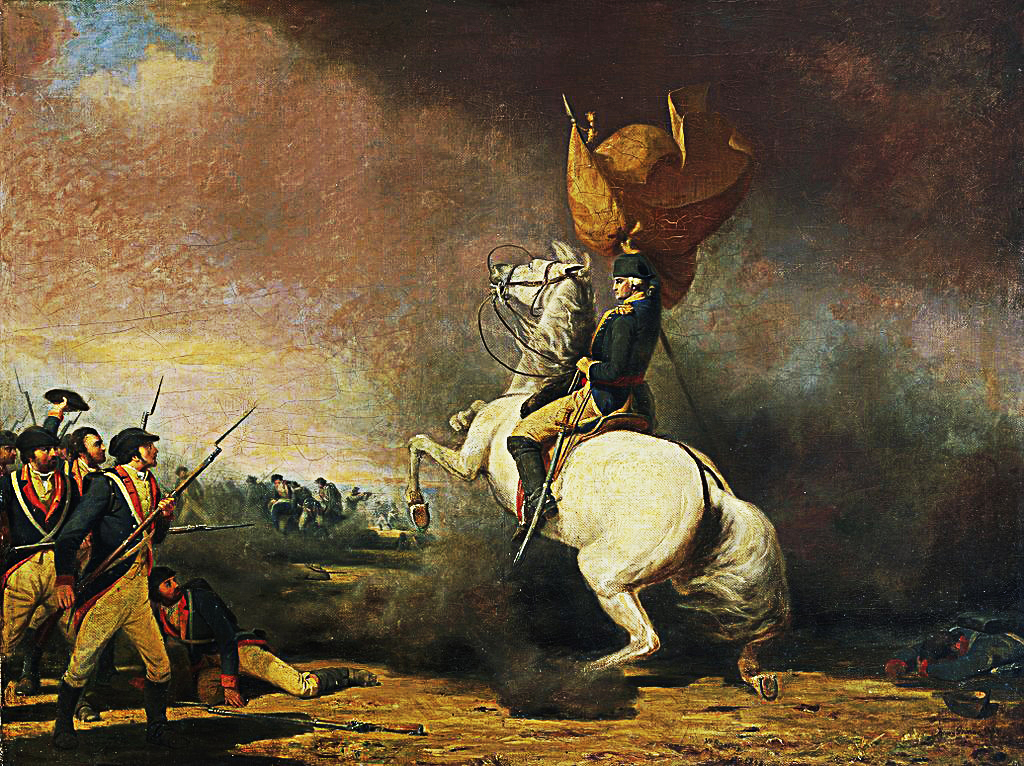
George Washington’s legacy has endured a long process of untangling myth from fact. The famous cherry tree incident never occurred, nor did Washington have wooden teeth, though he did have only one tooth by the time he became president and wore a series of dentures made from metal and cow or hippopotamus bone. In portraits of Washington, the pain caused by his dentures is evident in his facial expression. Known for being emotionally reserved and aloof, Washington was concerned with personal conduct, character and self-discipline, but was known to bend the rules if necessary, especially in war. Although Washington was undoubtedly ambitious, he pursued his goals humbly and with quiet confidence in his abilities as a leader.
An extraordinary figure in American history and unusually tall at 6′ 3, Washington was also an ordinary man. He loved cricket and fox-hunting, moved gracefully around a ballroom, was a Freemason and possibly a Deist, and was an astute observer of the darker side of human nature. His favorite foods were pineapples, Brazil nuts (hence the missing teeth from cracking the shells) and Saturday dinners of salt cod. He possessed a wry sense of humor and, like his wife Martha, tried to resist the vanities of public life. Washington could also explode into a rage when vexed in war or political battles. Loyal almost to a fault, he could also be unforgiving and cold when crossed. When Republican Thomas Jefferson admitted to slandering the president in an anonymous newspaper article for his support of Federalist Alexander Hamilton’s policies, Washington cut Jefferson out of his life. On at least one occasion, Washington’s stubbornness inspired John Adams to refer to him as Old Muttonhead.
An unenthusiastic political leader, Washington nevertheless recognized his unique and symbolic role in keeping a fledgling nation together. He worked hard to reconcile competing factions within his administration and was keenly aware of setting unwritten rules of conduct for future presidents. He struggled with advisors over what sort of image a president should project. He preferred one of dignity and humility and stumbled when encouraged to act out of character or monarchical. After two terms, old, tired, and disillusioned with vicious partisan politics, he resigned. His granddaughter remembered him as a prisoner of his own celebrity. Abigail Adams described Washington as having a dignity which forbids familiarity mixed with an easy affability which creates love and reverence.
After leaving office, Washington returned to Mount Vernon, indulged his passion for the rural life and started a successful whiskey distillery. A member of the Virginia planter class, he grew increasingly uncomfortable with the hypocrisy of owning slaves, yet publicly he promoted a gradual abolition of slavery. In his will he requested that his slaves be freed upon Martha’s death. Although he and Martha had a good relationship, the great love of his life was Sally Fairfax, the wife of his friend George. Abandoning his characteristic self-control, Washington wrote to Sally toward the end of his life, confessing that his moments with her had been the happiest of his life.
On December 14, 1799, Washington died of a severe respiratory ailment. He humbly identified himself in his will as George Washington, of Mount Vernon, a citizen of the United States.
History Channel / Wikipedia / Encyclopedia Britannica / New World Encyclopedia.org /
White House.gov / Mount Vernon.org / Library Of Congress.gov /
George Washington is born on February 22, 1732 (YouTube) 

U.S. hockey team beats the Soviets in the “Miracle on Ice” on February 22, 1980
U.S. hockey team beats the Soviets in the “Miracle on Ice”: In one of the most dramatic upsets in Olympic history, the underdog U.S. hockey team, made up of college players, defeats the four-time defending gold-medal winning Soviet team at the XIII Olympic Winter Games in Lake Placid, New York. The Soviet squad, previously regarded as the finest in the world, fell to the youthful American team 4-3 before a frenzied crowd of 10,000 spectators. Two days later, the Americans defeated Finland 4-2 to clinch the hockey gold.
The Soviet team had captured the previous four Olympic hockey golds, going back to 1964, and had not lost an Olympic hockey game since 1968. Three days before the Lake Placid Games began, the Soviets routed the U.S. team 10-3 in an exhibition game at Madison Square Garden in New York City. The Americans looked scrappy, but few blamed them for it–their average age, after all, was only 22, and their team captain, Mike Eruzione, was recruited from the obscurity of the Toledo Blades of the International League.
Few had high hopes for the seventh-seeded U.S. team entering the Olympic tournament, but the team soon silenced its detractors, making it through the opening round of play undefeated, with four victories and one tie, thus advancing to the four-team medal round. The Soviets, however, were seeded No. 1 and as expected went undefeated, with five victories in the first round.
On Friday afternoon, February 22, the American amateurs and the Soviet dream team met before a sold-out crowd at Lake Placid. The Soviets broke through first, with their new young star, Valery Krotov, deflecting a slap shot beyond American goalie Jim Craig’s reach in the first period. Midway through the period, Buzz Schneider, the only American who had previously been an Olympian, answered the Soviet goal with a high shot over the shoulder of Vladislav Tretiak, the Soviet goalie.

In the second period, the irritated Soviets came out with a new goalie, Vladimir Myshkin, and turned up the attack. The Soviets dominated play in the second period, outshooting the United States 12-2, and taking a 3-2 lead with a goal by Alesandr Maltsev just over two minutes into the period. If not for several remarkable saves by Jim Craig, the Soviet lead would surely have been higher than 3-2 as the third and final 20-minute period began.
Nearly nine minutes into the period, Johnson took advantage of a Soviet penalty and knocked home a wild shot by David Silk to tie the contest again at 3-3. About a minute and a half later, Mike Eruzione, whose last name means “eruption” in Italian, picked up a loose puck in the Soviet zone and slammed it past Myshkin with a 25-foot wrist shot. For the first time in the game, the Americans had the lead, and the crowd erupted in celebration.
There were still 10 minutes of play to go, but the Americans held on, with Craig making a few more fabulous saves. With five seconds remaining, the Americans finally managed to get the puck out of their zone, and the crowd began counting down the final seconds. When the final horn sounded, the players, coaches, and team officials poured onto the ice in raucous celebration. The Soviet players, as awestruck as everyone else, waited patiently to shake their opponents’ hands.
The so-called Miracle on Ice was more than just an Olympic upset; to many Americans, it was an ideological victory in the Cold War as meaningful as the Berlin Airlift or the Apollo moon landing. The upset came at an auspicious time: President Jimmy Carter had just announced that the United States was going to boycott the 1980 Summer Games in Moscow because of the Soviet invasion of Afghanistan, and Americans, faced with a major recession and the Iran hostage crisis, were in dire need of something to celebrate. After the game, President Carter called the players to congratulate them, and millions of Americans spent that Friday night in revelry over the triumph of “our boys” over the Russian pros.
As the U.S. team demonstrated in their victory over Finland two days later, they weren't your run-of-the-mill amateur squad. Three-quarters of the squad were top college players who were on their way to the National Hockey League (NHL), and coach Herb Brooks had trained the team long and hard in a manner that would have made the most authoritative Soviet coach proud. The 1980 U.S. hockey team was probably the best-conditioned American Olympic hockey team of all time–the result of countless hours running skating exercises in preparation for Lake Placid. In their play, the U.S. players adopted passing techniques developed by the Soviets for the larger international hockey rinks, while preserving the rough checking style that was known to throw the Soviets off-guard. It was these factors, combined with an exceptional afternoon of play by Craig, Johnson, Eruzione, and others, that resulted in the miracle at Lake Placid.
History Channel / Wikipedia / Wisconsin State Journal / Olympic.org /
National Collegiate Athletic Association (NCAA) /
U.S. hockey team beats the Soviets in the “Miracle on Ice” on February 22, 1980 (YouTube) 

This Day in History February 22
• 1371 House of Stuart (1371-1807): Robert II becomes King of Scotland, beginning the Stuart dynasty.
• 1632 Ferdinando II de' Medici, Grand Duke of Tuscany, the dedicatee, receives the first printed copy of Galileo's Dialogue Concerning the Two Chief World Systems.
• 1744 War of the Austrian Succession: Battle of Toulon: Causes several Royal Navy captains to be court-martialed, and the Articles of War to be amended.
• 1797 War of the First Coalition: Battle of Fishguard: The last Invasion of Britain begins near Fishguard, Wales.
• 1847 Mexican–American War: Battle of Buena Vista: Five thousand American troops defeat 15,000 Mexican troops.
• 1856 The United States Republican Party opens its first national convention in Pittsburgh.
• 1915 World War I: Imperial German Navy institutes unrestricted submarine warfare.
• 1942 World War II: President Franklin D. Roosevelt orders General Douglas MacArthur out of the Philippines as the Japanese victory becomes inevitable.
• 1943 World War II: Members of the White Rose resistance, Sophie_Scholl, Hans Scholl and Christoph Probst are executed in Nazi Germany.
• 1944 World War II: Bombing of Nijmegen: American aircraft mistakenly bomb the Dutch towns of Nijmegen, Arnhem, Enschede and Deventer.
• 1944 World War II: The Soviet Red Army recaptures Krivoi Rog.
• 1973 Cold War: Following President Richard Nixon's visit to the People's Republic of China, the two countries agree to establish liaison offices.
Wikipedia.org
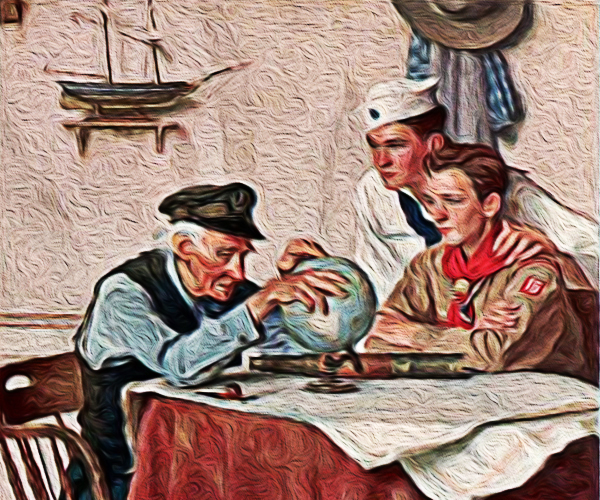
Understanding Military Terminology
Preplanned Air Support
(DOD) Air support in accordance with a program, planned in advance of operations.
Joint Publications (JP 3-09.3) Close Air Support
Pre-position
To place military units, equipment, or supplies at or near the point of planned use or at a designated location to reduce reaction time, and to ensure timely support of a specific force during initial phases of an operation.
Also called PE.
Joint Publications (JP 4-0) Joint Logistics
Pre-positioned War Reserve Stock
The assets that are designated to satisfy the pre-positioned war reserve materiel requirement.
Also called PWRS.
Joint Publications (JP 4-03) Joint Bulk Petroleum and Water Doctrine
Joint Publication - Department of Defense Dictionary of Military and Associated Terms
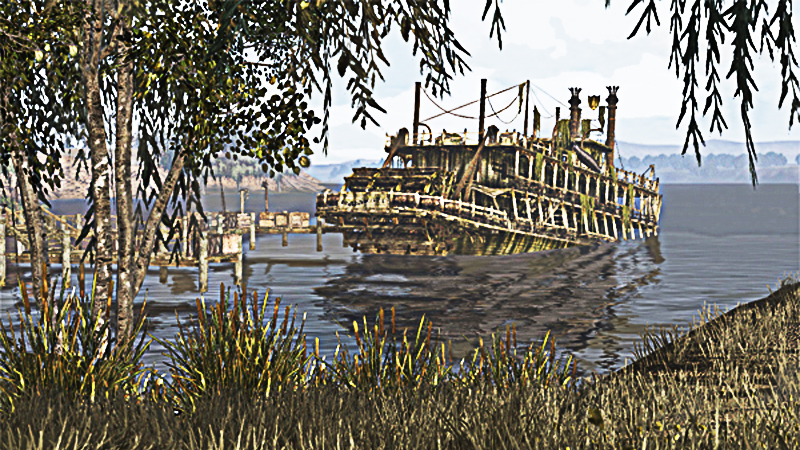
The Old Salt’s Corner
“Tales of Legendary Ghost Ships”
Iron Mountain Riverboat
Many say ship disappearances ware the result of some supernatural force, however it is far more likely that each incident is a case of a big, stormy ocean taking its toll on small, poorly-maintained, or simply unlucky craft. But when a ship disappears without a trace from a river, it’s harder to imagine an explanation. And the legend of the SS Iron Mountain is difficult to explain away.
Here is how her story is usually told. This is an excerpt of the version on paranormal.about.com, complete with the picture that’s most often associated with the SS Iron Mountain:
In June, 1872, the S.S. Iron Mountain steamed out of Vicksburg, Mississippi with an on-deck cargo of bailed cotton and barrels of molasses. Heading up the Mississippi River toward its ultimate destination of Pittsburgh, the ship was also towing a line of barges.
Later that day, another steamship, the Iroquois Chief, found the barges floating freely downriver. The towline had been cut. The crew of the Iroquois Chief secured the barges and waited for the Iron Mountain to arrive and recover them. But it never did. The Iron Mountain, nor any member of its crew, were ever seen again. Not one trace of a wreck or any piece of its cargo ever surfaced or floated to shore. It simply vanished.
Some versions go on to say that ghostly voices can be heard near the site screaming “They’re trying to hurt me! Help!”
The Mississippi River was and is the most important naviagble river in the country. In parts it’s over a mile wide and plenty deep enough to swallow a steam ship. Near the region in question, the present day river is about ¾ of a mile across, but 150 years ago she may have been much wider, especially during flood season. It is conceivable that a ship could have sunk rapidly with no one on shore noticing, especially in a time before radio. It would be unusual for no wreckage or debris to be found. Nearly every part of the ship and its cargo was buoyant. The river was a highway, and one of the dozens of other ships also on the river should have seen wreckage or cargo floating downstream.
The shores in that region were dotted with farms, plantations and towns, with frequent riverboat landings to provide the population with supplies and mail and also to transport cotton and other goods north. Riverboats had regular routes, but stops would be scheduled according to where cargo needed to be. These comings and goings were reported in local newspapers. Because of this, we know that there definitely was a sternwheeler on the Mississippi River called the towboat Iron Mountain. She was launched in 1872, and served for ten years. At 181 feet long, she was a giant, and modern with all steel boilers—the first on the river. This was a ship that everyone on the river would recognize.
On March 26, 1882, the SS Iron Mountain was steaming north from Vicksburg towing five empty barges. After she left Vicksburg, the next reported sighting wasn’t of the vessel, it was of her five empty barges, which had been cut loose and were coming down the river, presenting a hazard to navigation.
Such occurrences were not uncommon. The Mississippi is notorious difficult to navigate as the water level changes and submerged objects shift and can’t be seen. A ship pulling barges would cut them loose if there was trouble. This could include running aground or even having an issue with the boilers. Also, the river was in a flood state so severe, it became known as the “Flood of 1882”. It was the largest flood on the Mississippi in recorded history up until that time. This meant that riverboat captains were steaming blind as any obstructions they'd memorized were now underwater, in a different place, or replaced by other unseen hazards.
The next day as men went to survey the damage, they were surprised that the Iron Mountain had indeed, vanished. An extensive search was conducted and while some small parts of the ship were located downstream, the ship itself could not be found.
It wasn’t until several months later, that her wreck was found. Oddly, it wasn’t found on the river, but in a field on a former plantation called Omega. How did a large sternwheeler get off the river and into a field? As was mentioned, the Mississippi River was flooding. Where the Iron Mountain ran into trouble, the river had broken through a levee near Omega Landing. As the river poured through the levee, so must have Iron Mountain, now miles downstream from where it was originally damaged.
With newspapers reporting not only the sinking, but also the finding of the vessel, how did the legend start? Based on the many stories, it seems that they’re all copying each other. The earliest version of the legend was in the Frank Edward’s book, Strangest of All. Published in 1956, this was Edwards’ second book of embellished stories continuing a tradition established by Charles Forte decades earlier. The book was popular, and it’s possible that he was the originator of the tall tale that has been repeated ever since. Books published as recently as 2010 still report the vessel as “vanished without a trace”.
Skeptoid

“I’m Just Sayin”
“The torture of a bad conscience is the hell of a living soul.”
“A dog barks when his master is attacked.
I would be a coward if I saw that God's truth is attacked and yet would remain silent.”
“Yet consider now,
whether women are not quite past sense and reason,
when they want to rule over men.”
~ John Calvin

“Thought for the Day”
“Everything in excess is opposed to nature.”
“Make a habit of two things: to help; or at least to do no harm.”
“There are in fact two things,
science and opinion;
the former begets knowledge, the latter ignorance.”
“If we could give every individual the right amount of nourishment and exercise,
not too little and not too much,
we would have found the safest way to health.”
~ Hippocrates

“What I Learned”
“Large skepticism leads to large understanding.
Small skepticism leads to small understanding.
No skepticism leads to no understanding.”
~ Anonymous

Second Hand News: Articles from Week 08 - February 22, 2021 - February 28, 2021
 House passes $1.9 trillion COVID spending bill with minimum wage hike
• Minimum wage raise still creates problems for White House
• Biden’s Iran appeasement
House passes $1.9 trillion COVID spending bill with minimum wage hike
• Minimum wage raise still creates problems for White House
• Biden’s Iran appeasement
CPAC celebrates Trump as if he didn't lose in 2020
• John Durham resigns as U.S. attorney but remains special counsel
• FBI narrows focus to chemical spray video in death of Capitol Police officer
Biden decision to kill Keystone XL could spell disaster
• Ilhan Omar calls on Democrats to abolish the filibuster and remove Senate parliamentarian who blocked minimum wage increase
• Federal court weighs dismissal of Title IX transgender sports case
MOST READ: Border Patrol transferring more than 2,000 unaccompanied children a week in February, as surge strains federal resources
• Dana Perino breaks down on-air after listening to domestic abuse survivor plea to keep cash bail
• Maricopa County judge finds GOP Senate subpoenas of election materials are 'legal and enforceable'
• EXCLUSIVE: 'Divisive and offensive' race theory training forced on San Diego County healthcare workers
Washington Examiner
 Biden Promised A Return To Normalcy, So Why Are There Still Troops And Fences In DC?
• After Just One Month In Office, Biden Orders Airstrike In Syria
• Biden vs Trump On National Security: Here’s The New Administration’s First Month Report Card
Biden Promised A Return To Normalcy, So Why Are There Still Troops And Fences In DC?
• After Just One Month In Office, Biden Orders Airstrike In Syria
• Biden vs Trump On National Security: Here’s The New Administration’s First Month Report Card
Vox Peddles Fake News That Dolly Parton Has A ‘Dark Side’ For Rejecting The Progressive-Or-Bigot Binary
• Huffington Post Reporter Matt Fuller Makes Up Capitol Police Investigation Into Republican Congressman
• Biden’s Secretary Of State Poses With Upside-Down Mexican Flag While Touting Devotion To US-Mexico Relationship
MOST READ: Rand Paul Blasts Transgender Biden Nominee For Endorsing Sex Changes For Young Children
• ‘Blessings Of Liberty:’ How ‘The Equality Act’ Viciously Attacks Christians, Freedom, Society, Sex, And You
• FIVE Things You Need To Know About The Extremist ‘Equality Act’ House Democrats Just Passed
• Amazon Strips Clarence Thomas Documentary From Streaming Service During Black History Month
The Border Surge Is Underway, And The Biden Administration Is Unprepared
• Your Kids Would Be Better Off Feral Than Going To Schools That Make Them Anti-American Racists
• In Final Days, Trump Gave Up On Releasing Russiagate Files, Nunes Prober Says
• Estimates: George Floyd Riots To Cost 66 Times More Than Capitol Damage
The Federalist
 CORRUPTION CHRONICLES: Black, Latino Seniors in Virginia Get COVID-19 Vaccine Priority as White 85-Year-Olds Wait
• ‘He’d be there anytime I needed him:’ Player defends coach fired for criticizing critical race theory
CORRUPTION CHRONICLES: Black, Latino Seniors in Virginia Get COVID-19 Vaccine Priority as White 85-Year-Olds Wait
• ‘He’d be there anytime I needed him:’ Player defends coach fired for criticizing critical race theory
“Investigating the Investigators:” Judicial Watch to Facebook: End Censorship of Trump
• Judicial Watch Sues Capitol Police for Riot Emails and Video
• Judicial Watch Seeks Release of Sally Yates Records on Her Refusal to Defend President Trump’s Travel Ban
Impeach Obama?
Judicial Watch
Column: CNN Should Shut Up About ‘Misinformation’
• Barely Trying: CNN Finally Covers New York Governor Andrew Cuomo Claims...But Gives It 96 Seconds in Two Days
• Doocy Smash: FNC Reporter Presses White House Press Secretary Jen Psaki on Cuomo Sex Claims, COVID Scandals
CBS Refuses to Show Shipping Containers Biden Stores Migrant Kids In
• TABC Claims Cuomo’s Harassment Was a ‘Joke,’ CBS and NBC Move Past
• Shock: New York Times’ Dive Into Race Hoax at Smith College Questions Lefty Race Doctrine
Former Comedians-turned Democratic Activists: Jimmy Kimmel’s Jokes Are So Awful, You Almost Feel Bad for Him
 Mr. Answer Man Please Tell Us: Why Do We Call Our Spouse's Relatives “In-Laws”?
Mr. Answer Man Please Tell Us: Why Do We Call Our Spouse's Relatives “In-Laws”?
While we’re all busy trying to remember that the plural of mother-in-law is mothers-in-law, not mother-in-laws, we often forget to ask a far more interesting question: Why do we call them in-laws in the first place?
You might assume it’s because your spouse’s family members are related to you by law, not by blood—but the law in question has nothing to do with the marriage license your officiant ships off to the county clerk. According to the Oxford English Dictionary, in-law refers to canon law, a church’s set of rules and regulations that covers, among many other things, which relatives you’re prohibited from marrying. Since the earliest known mention of the term in English is brother-in-law from the 14th century, it was most likely citing the canon law of the Catholic Church (as the Church of England wasn’t founded until the 16th century).

At its inception, in-law was specifically used to describe any non-blood relative that the church forbade you from marrying if your spouse died: your spouse’s siblings, parents, and children, and even your own stepsiblings, stepparents, and stepchildren. So father-in-law, as The Word Detective explains, could’ve either meant your spouse’s father, or your mother’s new husband. But by the late 19th century - at which point the Church of England and other Protestant faiths had established their own canon laws with varying marriage rules - the colloquial definition had expanded to include all spousal relatives, and in-laws became a standalone phrase. The earliest written mention of it comes from an 1894 article in Blackwood’s Edinburgh Magazine, which states that
”the position of the “in-laws” (a happy phrase which is attributed with we know not what reason to her Majesty, than whom no one can be better acquainted with the article) is often not very apt to promote happiness.”
In other words, tension between people and their in-laws has been around for as long as the phrase itself. If that's part of what brought you here in the first place, here are 12 pieces of 19th-century advice for dealing with them.
Mental Floss / Wikipedia / Encyclopedia Britannica /
Family Education / Focus on the Family / English Language Exchange /
Why Do We Call Our Spouse's Relatives “In-Laws”? (YouTube) 
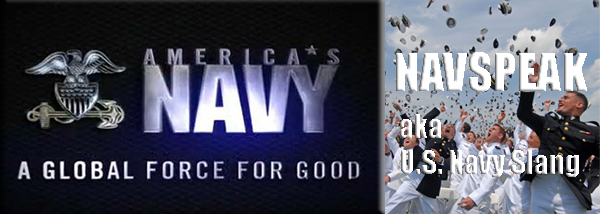
NAVSPEAK aka U.S. Navy Slang
Screaming Alpha: A sailor who is on fire and is running around screaming. Alpha fires leave ash. Bravo fires burn flammable liquids. Charlies are electrical fires, and Deltas burn exotic materials, often metals like magnesium.
Scrambled Eggs: Gold embroidered decoration on a Commander's/Captain's cover. Admirals have Double Eggs. The similar silver clouds and lightning bolts addition to an Air Force Major's/Colonel's hat is called Farts and Darts.
Screw: Propeller.
Screwing the Pooch: Making a huge mistake. “You really screwed the pooch this time.”
Scullery: The washroom on board a ship for eating implements such as knives, forks, trays, and cups.
Scupper:
1) (Surface Navy) Opening in a bulwark which allows water to drain overboard.
2) (Submarine Service) A funnel-like device used to collect rogue liquids (usually from overflowing tanks in engineering spaces), as free openings to the outside are frowned upon in submarine design.
Scupper Trout: Sewage solids which have washed overboard, or have been pumped overboard. Also called “Cornbacked Gator” or “Brown Trout”.
Scuttle: A smaller, sealable, opening in a larger, heavier door or hatch.
Scuttle (verb): To discard something over the side of the ship.
Scuttlebutt:
1) A drinking fountain.
2) Generally reliable but incomplete information about a subject.
3) A rumor (because rumors are spread when crew members gather around water fountains). This is the only thing in the universe that can travel faster than light.
4) Chief Kitchen's office in Slidell, LA.
SCWS: Seabee Combat Warfare Specialist.
Wiktionary.org

Just for you MARINE
Schmuckatelli: Generic, unnamed junior Marine, from the Yiddish pejorative “schmuck”. Often gets into trouble, especially when accompanied by his friend Benotz.
SCIF: Sensitive Compartmented Information Facility, a place classified materials are processed or stored.
Scrambled Eggs: Gold oak leaf embroidery found on field grade and general officers' barracks cap visors and mess dress cuffs. Profanity.
Scrounge: Appropriate, borrow, or acquire (possibly by doubtful means); derived from “scringe”, meaning to search about, rummage, or pilfer.
Scullery: Place where dishes are washed.
Scuttlebutt: Gossip; or a drinking fountain, from “butt” (cask) and “scuttle” (a hole in a ship's side at deck level that allows water to drain from the deck), a cask that had an opening fitted with a spigot used to contain fresh water for drinking purposes. Because people gathered around a scuttlebutt, gossip, rumors, and sea stories are also known as scuttlebutt.
Wikipedia.org
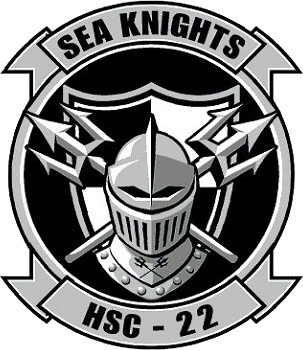
Naval Aviation Squadron Nicknames
HSC-22 Helicopter Sea Combat (HSC) Squadron TWO TWO - nicknamed the “Sea Knights”
United States Navy Naval Air Station - Helicopter Sea Combat (HSC), Naval Station Norfolk - Norfolk, Virginia / Squadron Lineage: HSC-22: October 1, 2006 - present.

Where Did That Saying Come From?

“Put the cart before the horse:”
Meaning: Reverse the accepted or logical order of things.
History: The accompanying horse and cart image looks preposterous. That's as it should be as the word 'preposterous' entered the English language precisely to describe such back to front imagery.
Of course, 'pre' derives from Latin and is a standard prefix, that is, it is 'at the front'. Likewise, the Latin 'post' means 'at the back', so 'preposterous' actually denotes the normal arrangement of things, with the front at the front and the back at the back. 'Postprerous' might have been a better choice of word but, like ''head over heels', which also makes no sense, it's too late to change now.
The earliest known reference to 'putting the cart before the horse' comes in John Heywood's A dialogue conteinyng the nomber in effect of all the prouerbes in the englishe tongue, 1589:
“To tourne the cat in the pan, Or set the cart before the hors.”
Heywood was there comparing two things that were similarly nonsensical - cooking a cat and putting the cart before the horse.
A hysteron proteron is a figure of speech we inherited from the Greeks, in which the thing that should come second is put first; for example, 'putting on one's shoes and socks'. It isn't surprising that, when needing an Anglicised proverb to express that notion, the English turned toward what they knew best, that is, agriculture, and in particular, horses. There are more 'horse phrases' in English than those referring to any other animal, including 'man's best friends', dogs.
The notion of things being the opposite of what they rightfully should be seems to have played on the minds of the English at the time when modern English began to be formed, that is, in the 16th century. It is a common theme in Shakespeare and The Tempest, Macbeth and A Midsummer Night's Dream all contain 'world turned upside down' magical elements.
Other 'back to front' English phrases include 'the tail is wagging the dog', 'upside down', 'topsy-turvy' and 'inside out'.
Phrases.org.uk

Science & Technology

Theorists calculate upper limit for possible quantization of time
• How conspiracy theories emerge - and how their storylines fall apart
• Life-emulating molecules show basic metabolism
• The evolution of the synapse
• Unorthodox desalination method could transform global water management
Phys.org / MedicalXpress / TechXplore
Dolphins learn unusual hunting behavior from their friends
• NASA’s new rover will collect martian rocks - and clues to planet’s ancient climate
• Mars mission would put China among space leaders
• This shrimp has some of the fastest eyes on the planet
• The chicken first crossed the road in Southeast Asia, ‘landmark’ gene study finds
Science AAAS

Bizarre News (we couldn’t make up stuff this good - real news story)
Sled Dogs Are Closely Related to 9,500-Year-Old 'Ancient Dog'

Source: University of Copenhagen, Faculty of Health and Medical Sciences
Summary: Sled dogs are much older and have adapted to Arctic conditions much earlier than previously thought. Researchers show that ancestors of modern sled dogs have worked and lived with humans for over 9,500 years.
Dogs play an important role in human life all over the world - whether as a family member or as a working animal. But where the dog comes from and how old various groups of dogs are is still a bit of a mystery.
Now, light has been shed on the origin of the sledge dog. In a new study published in SCIENCE, researchers from the Faculty of Health and Medical Sciences, University of Copenhagen, show that the sledge dog is both older and has adapted to the Arctic much earlier than thought. The research was conducted in collaboration with the University of Greenland and the Institute of Evolutionary Biology, Barcelona.
“We have extracted DNA from a 9,500-year-old dog from the Siberian island of Zhokhov, which the dog is named after. Based on that DNA we have sequenced the oldest complete dog genome to date, and the results show an extremely early diversification of dogs into types of sledge dogs”, says one of the two first authors of the study, PhD student Mikkel Sinding, the Globe Institute.
Until now, it has been the common belief that the 9,500-year-old Siberian dog, Zhokhov, was a kind of ancient dog - one of the earliest domesticated dogs and a version of the common origin of all dogs. But according to the new study, modern sledge dogs such as the Siberian Husky, the Alaskan Malamute and the Greenland sledge dog share the major part of their genome with Zhokhov.
“This means that modern sledge dogs and Zhokhov had the same common origin in Siberia more than 9,500 years ago. Until now, we have thought that sledge dogs were only 2-3,000 years old”, says the other first author, Associate Professor Shyam Gopalakrishnan, Globe Institute.
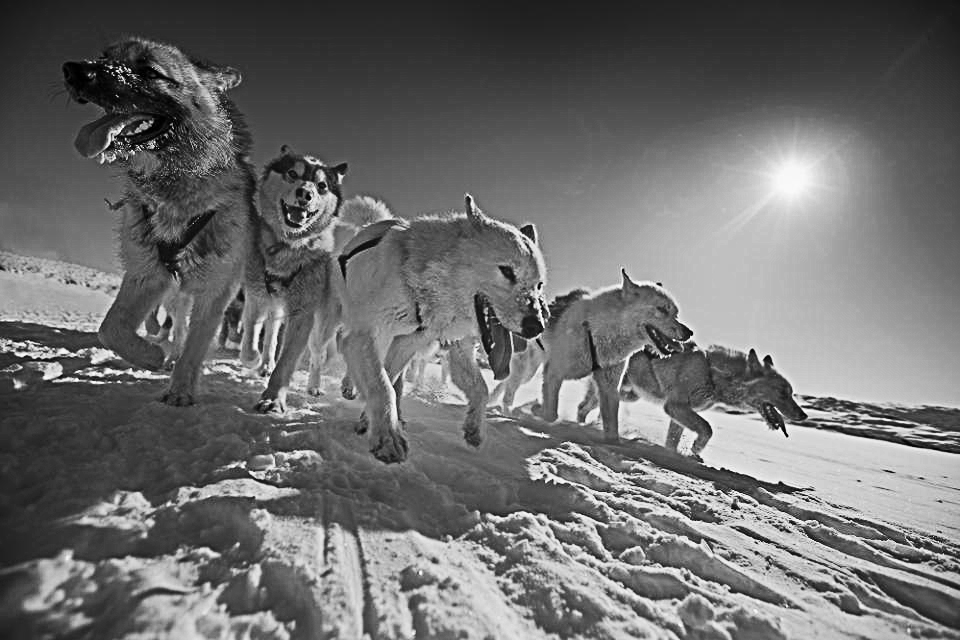
The Original Sledge Dog
To learn more about the origins of the sledge dog, researchers have further sequenced genomes of a 33,000-year-old Siberian wolf and ten modern Greenlandic sledge dogs. They have compared these genomes to genomes of dogs and wolves from around the world.
“We can see that the modern sledge dogs have most of their genomes in common with Zhokhov. So, they are more closely related to this ancient dog than to other dogs and wolves. But not just that - we can see traces of crossbreeding with wolves such as the 33,000-year-old Siberian wolf - but not with modern wolves. It further emphasises that the origin of the modern sledge dog goes back much further than we had thought”, says Mikkel Sinding.
The modern sledge dogs have more genetic overlap with other modern dog breeds than Zhokhov has, but the studies do not show us where or when this occurred. Nevertheless, among modern sledge dogs, the Greenland sledge dogs stands out and has the least overlap with other dogs, meaning that the Greenland sledge dog is probably the most original sledge dog in the world.
Common Features with Inuit and Polar Bears
In addition to advancing the common understanding of the origin of sledge dogs, the new study also teaches the researchers more about the differences between sledge dogs and other dogs. Sledge dogs do not have the same genetic adaptations to a sugar and starch rich diet that other dogs have. On the other hand, they have adaptations to high-fat diets, with mechanisms that are similar to those described for polar bears and Arctic people.
“This emphasises that sledge dogs and Arctic people have worked and adapted together for more than 9,500 years. We can also see that they have adaptations that are probably linked to improved oxygen uptake, which makes sense in relation to sledding and give the sledding tradition ancient roots”, says Shyam Gopalakrishnan.
Science Daily (06/25/2020) 

Second Hand News: Articles from Week 08 - February 22, 2021 - February 28, 2021
 Biden warns Iran to “Be Careful” and says they “Can't act with impunity” after U.S. airstrike that “killed 22” Tehran-backed militia fighters in Syria
• Biden and White House Press Secretary Jen Psaki are branded hypocrites after their old tweets slamming Trump's Middle East air strikes resurface following U.S. bombing raid on Syria that “killed 22”
Biden warns Iran to “Be Careful” and says they “Can't act with impunity” after U.S. airstrike that “killed 22” Tehran-backed militia fighters in Syria
• Biden and White House Press Secretary Jen Psaki are branded hypocrites after their old tweets slamming Trump's Middle East air strikes resurface following U.S. bombing raid on Syria that “killed 22”
“It's not time to relax:” Biden warns new variants could cause another COVID surge and urges Americans not to get complacent - even though cases are at their lowest level since November
• House passes Biden's $1.9 trillion COVID relief with $1,400 direct payments: Bill moves to the Senate after two Democrats broke ranks in 219-212 vote
Biden tells Saudi king he will hold country 'accountable' for human rights abuses after U.S. government said Crown Prince Mohammed bin Salman DID approve murder of Jamal Khashoggi
• Joe Biden touts FDA recommendation of new Johnson & Johnson shot as he visits mass vaccination site in Houston, promising ‘rapid progress’ against COVID after he and Jill make first joint trip on Air Force One to visit disaster zone in wake of Texas' power and water crisis
Special Counsel John Durham resigns as U.S. attorney but says he will keep investigating the origins of the Russia probe
• Rand Paul compares gender change surgery for minors to genital mutilation in furious exchange with Biden's transgender pick for assistant HHS secretary
• Republican Senators send letter to Jeff Bezos demanding to know why Amazon pulled a book 'that challenged the transgender movement'
Boeing had been trying to strengthen 777 engine covers for two YEARS before fan blade snapped off United Airlines flight and broke through the casing leaving debris scattered over Denver suburbs
• No more ultra-cold! FDA says Pfizer's coronavirus vaccine can be shipped and stored at REGULAR freezer temperatures instead of -76ºF in a move to ease rollout
U.S. Olympic gold medal-winning gymnastics coach linked to Larry Nassar shoots himself dead after he was accused of trafficking 22 children, pushing a girl to attempt suicide by saying she was too fat and telling another to kill herself
• Three Republicans cross the aisle to pass Democrats' LGBTQ Equality Act that critics say is an attack on religious freedom and lets men compete in women's athletics
• Mr and Mrs Potato Head go gender neutral: Toy is renamed plain old 'Potato Head' after makers Hasbro say 70-year toy needed to break from gender norms
Daily Mail
 Education Insanity: Top 10 Stories Of The Week (Vol. 4)
• Some English Teachers Cancel Shakespeare Because Of ‘Racism, Homophobia, Classism’
Education Insanity: Top 10 Stories Of The Week (Vol. 4)
• Some English Teachers Cancel Shakespeare Because Of ‘Racism, Homophobia, Classism’
The Hypocritical Response Of Progressive Women On The Cuomo Sexual Harassment Allegations
• Is He Guilty Of Sexual Misconduct? Depends On His Political Party.
The Real Authoritarians
• Bill Gates Says He Is Fully Vaccinated, Will Still Wear Masks For Now
Why Two Democratic Senators Oppose the $15 Minimum Wage
• THREE Times Biden And Trump Did The Same Thing… And The Media Reaction Was Totally Different
“I Will Give Them Home Field Advantage - And Dismantle Them:” Critical Race Theory Critic Throws Gauntlet Down To New York Times
• FOUR Ways The ‘Equality Act‘ Could Damage Religious Freedom In America
Daily Wire
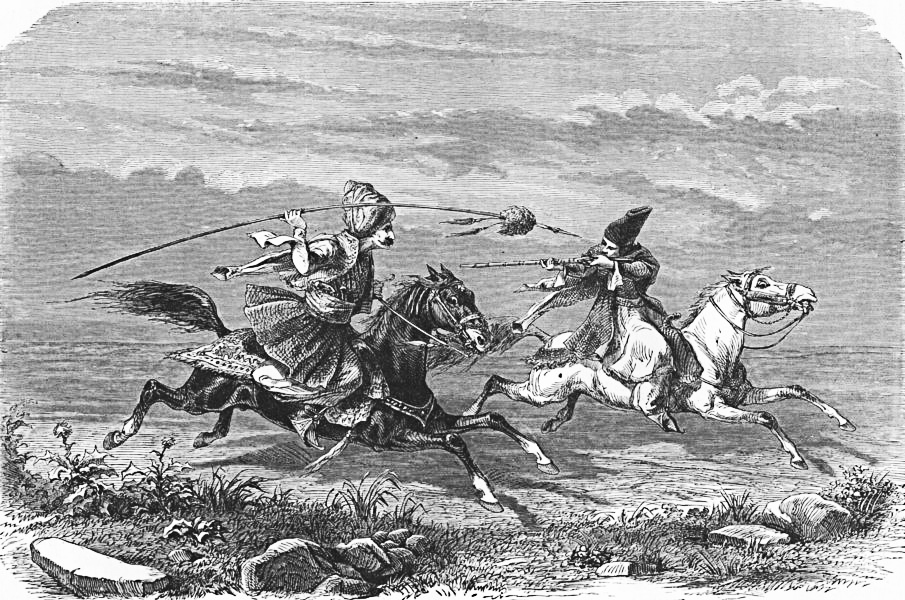
Entire region judges U.S. responses to Iraqi rocketing from Iran.

The 2015 Joint Comprehensive Plan of Action (JCPOA) is irrelevant to today.

Russia fears a pro-Western Iran and will complicate all discussions.

After the cold snap, Texas Governor Abbot's natural gas threat suits Mexico President AMLO's PEMEX statism.

The hunt for the second International Space Station (ISS) leak continues.

Private property SpaceX surpasses the Big Space Space Launch System (SLS) fail.

Are these the last days of SLS?
 John Batchelor (02/22/2021)
John Batchelor (02/22/2021)


SONG FACTS

“All I Have to Do Is Dream”  - The Everly Brothers
- The Everly Brothers
Album: “The Everly Brothers - Greatest Hits”
Released 1958 
“All I Have to Do Is Dream”  , which sold over a million copies, was written by Boudleaux Bryant, who was half of the world famous husband-and-wife songwriting team, Boudleaux and Felice Bryant. Together, this talented couple penned many huge hits for The Everly Brothers' early hits, and other artists, including:
, which sold over a million copies, was written by Boudleaux Bryant, who was half of the world famous husband-and-wife songwriting team, Boudleaux and Felice Bryant. Together, this talented couple penned many huge hits for The Everly Brothers' early hits, and other artists, including:
“Bye, Bye Love”  ,
“Wake Up Little Susie”
,
“Wake Up Little Susie”  ,
“Bird Dog”
,
“Bird Dog”  ,
“Devoted to You”
,
“Devoted to You”  ,
“Hey Joe”
,
“Hey Joe”  ,
“Love Hurts”
,
“Love Hurts”  ,
“Raining In My Heart”
,
“Raining In My Heart”  and
“Rocky Top”
and
“Rocky Top”  .
.
Phil Everly (from everlybrothers.com):
“I remember hearing 'All I Have To Do Is Dream' on an acetate with Boudleaux's version on it, and I said, at the time, they could have put Boudleaux's out and it would have been a hit. It's just a great, great song. It's beautiful. Boudleaux was the main man who wrote all the great songs for us, and we love him.”
Chet Atkins played tremolo-style guitar chords on the song, providing an interesting musical backing to the Everly Brothers' unique vocal harmonies.
Boudleaux Bryant said regarding the phrase
“Only trouble is, gee whiz:” “I can't explain why I put that in there. It was just a lucky rhyme fall.”
“All I Have to Do Is Dream”  reached the U.S. charts in four straight decades:
reached the U.S. charts in four straight decades:
• The Everly Brothers took it to #1 in 1958.
• Richard Chamberlain's version went to #4 in 1963.
• Glen Campbell and Bobby Gentry reached #27 with it in 1970 and The Nitty Gritty Band landed at #66 in 1975.
• Andy Gibb and Victoria Principal peaked at #51 in 1981.
According to Billboard magazine, the song took just 15 minutes to write.
Boudleaux was literally the man of Felice's dreams. When she first met him, Boudleaux was playing a gig with his jazz band at the Sherwood Hotel in Milwaukee, where Felice was working as an elevator operator. But she saw him years earlier - in a dream when she was 8 years old. She told Country Music People in 1981:
“When I was eight years old, I dreamt of this man. He and I were dancing to 'our song,' and I remembered this man's face. So when I saw Boudleaux I recognized him! I don't know if you can call it love at first sight or 'My god, you friend, I was wondering when you'd come along.' But I just clung on to him. He didn't know who the hell I was, but somehow I knew who he was.”
The Everly Brothers official site / Rock & Roll Hall of Fame / Billboard / All Music / Song Facts / The Everly Brothers
Image: The Everly Brothers' Best (album)” by The Everly Brothers
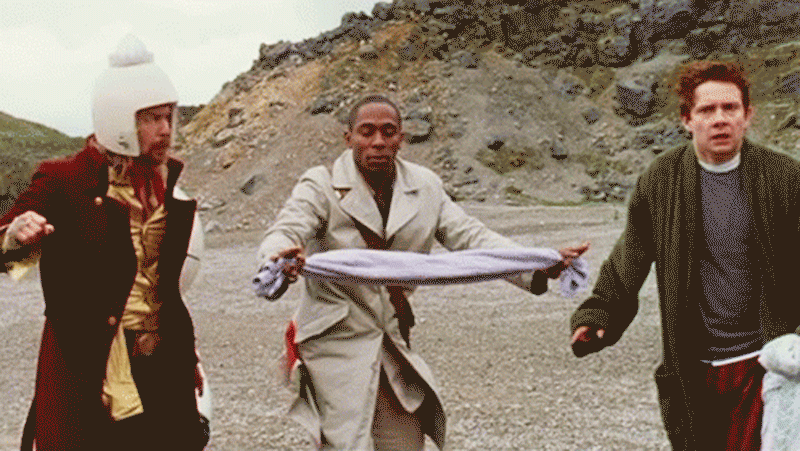
Trivia
● In the novel and movie “Hitchhikers Guide to The Galaxy”, what is the most important thing a hitchhiker can carry?
Answer to Trivia
● Rod Stewart's second album was called after which alley?
Answer to Trivia
● In 1607, what became the first permanent English settlement in North America?
Answer to Trivia
● In speaking, the use of an incorrect word in place of a word with similar sound is known as what?
Answer to Trivia

A Test for People Who Know Everything
From the Jeopardy Archives Category - “ANAGRAMS OF EACH OTHER” ($200)
(Alex: Each clue will require two words in a correct response.) (Anagram: Word or phrase formed by rearranging the letters of a different word or phrase)
“A spring month & a type of tuber.”
Answer to Jeopardy
From the Jeopardy Archives Category - “ANAGRAMS OF EACH OTHER” ($400)
“An educator's task & dishonestly taking a test.”
Answer to Jeopardy
From the Jeopardy Archives Category - “ANAGRAMS OF EACH OTHER” ($600)
“A hypersensitive reaction to a substance & a place to exhibit artworks.”
Answer to Jeopardy
From the Jeopardy Archives Category - “ANAGRAMS OF EACH OTHER” ($800)
“The act of betraying your nation & one who serves it as a state's representative.”
Answer to Jeopardy
From the Jeopardy Archives Category - “ANAGRAMS OF EACH OTHER” ($1,000)
“One brightens your face & the other is dumped on you in “Double Dare”.”
Answer to Jeopardy

Joke of the Day

“Husband Drowns at the Guinness Brewery”
Brenda O'Malley is home making dinner, as usual, when Tim Finnegan arrives at her door. “Brenda, may I come in?” he asks. “I've somethin' to tell ya.”
“Of course you can come in, you're always welcome, Tim. But where's my husband?”
“That's what I'm here to be tellin' ya, Brenda. There was an accident down at the Guinness brewery...”
“Oh, God no!” cries Brenda. “Please don't tell me....”
“I must, Brenda. Your husband Shamus is dead and gone. I'm sorry.” Finally, she looked up at Tim.
“How did it happen, Tim?”
“It was terrible, Brenda. He fell into a vat of Guinness Stout and drowned.”
“Oh my dear Jesus! But you must tell me true, Tim. Did he at least go quickly?”
“Well, no Brenda... no. Fact is, he got out three times to pee.”







































